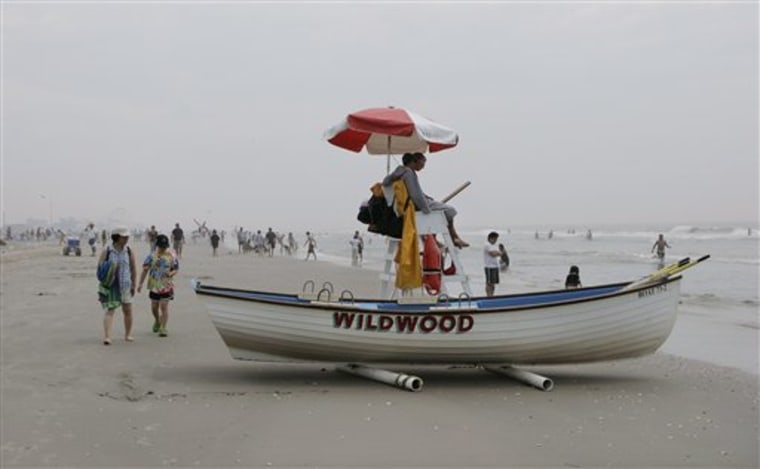New Jersey's most popular beach town is about to make a decision that has been criticized by environmentalists around the world — using wood cut from Amazon rainforests to repair a section of its boardwalk.
Wildwood, voted the state's best beach last summer by vacationers and others, will become just the latest of several New Jersey communities that have opted to use highly durable wood from the Brazilian ipe tree to build or fix boardwalks.
The wood looks good, lasts for decades, is strong, and can withstand moisture and the corrosive effects of salt better than other species of wood, making it popular for use in boardwalks.
Environmental groups contend the world's tropical rainforests are being wiped out by logging to satisfy demand for this kind of wood.
Mayor Ernest Troiano Jr. said Wildwood reluctantly turned to ipe wood only because a shipment of domestically grown black locust wood arrived in unusable condition.
"I'm not advocating tearing down the Brazilian rainforests," he said. "We wanted to use black locust, to do the right thing and the environmentally responsible thing. But the wood we ordered is not the wood that was delivered."
Unless a last-minute alternative can be found, Wildwood will start using ipe wood within the next few weeks to replace aging planks in front of the skee-ball arcades, body-piercing stands and fortune teller booths that line its boardwalk.
"We have the boardwalk torn open and it needs to be fixed and ready to go by Easter," Troiano said. "If we don't get that hole closed up, it will be a nightmare for our merchants."
Brazilian ipe vs. black locust
The move comes a year after Ocean City, a fellow Cape May County beach town, was criticized by environmentalists for using Brazilian ipe to replace part of its boardwalk. Thousands of protest e-mails from as far away as Australia, the Philippines, South Africa and New Zealand flooded the mayor's computer.
Ipe is a flowering tree that can grow to 100 feet, towering above the forest canopy. It is Brazil's largest timber export, with half of it sold to customers in the United States.
Ipe wood has been used in boardwalk projects from coast to coast, including Atlantic City, N.J.; New York; Baltimore; Chicago; Miami Beach, and Long Beach and Santa Monica, Calif.
Environmentalists have been trying for years to promote the use of abundant, domestically grown species like black locust as an alternative to rainforest wood. And Wildwood agreed to use black locust for its boardwalk project — a decision that was hailed by Tim Keating, executive director of Rainforest Relief, a New York volunteer group that opposes the use of rainforest wood.
However, a shipment of black locust from a New York supplier arrived in poor condition with pieces of bark, large knots and cracks.
"I equate it to our having paid for a new Cadillac, and having a beat-up 1972 Ford Pinto show up in the driveway," Troiano said. He estimated 90 percent of the wood was unusable.
'A traditionalist thing'
The locust wood cost about $100,000, part of a $3.5 million boardwalk repair project. Ocean City, about 20 miles up the coast, spent $1.1 million for Brazilian ipe for its boardwalk; that wood was supposed to be certified as having been harvested responsibly from trusted sources in the Amazon, making it more expensive.
Keating said he is worried that the poor condition of the black locust shipped to Wildwood will give the species a bad reputation among shore towns and discourage its use in other projects. He said he is trying to identify other suppliers of black locust that could be used for the rest of Wildwood's boardwalk project, even if the current three-block section is rebuilt with ipe wood.
Environmental groups have suggested Wildwood consider using planks made from recycled plastic, which is slowly catching on in boardwalks around the nation. At the Jersey shore, the towns of Belmar and Spring Lake are using it.
But Troiano said the current project has to be done with the same general type of material as ipe or black locust. He also raised aesthetic questions about plastic lumber.
"When people go to a boardwalk, they want to walk on a boardwalk; they don't want a plastic walk," Troiano said. "It's a traditionalist thing. They want wood under their feet."
More on | Amazon logging
